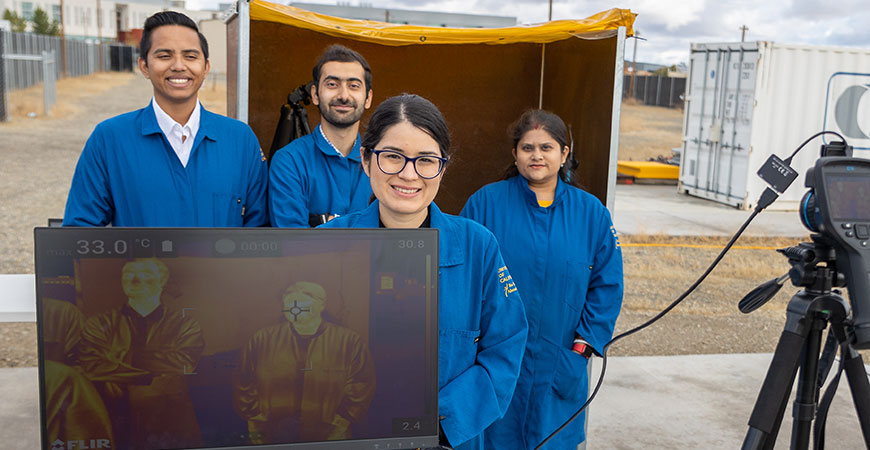
Fire scientists typically respond to agency opportunities and conduct research in response to past wildfires. But it is time they take more proactive, integrative, predictive approaches toward mitigating and adapting to this potentially devastating consequence of climate change, a group of scientists advocates.
Mechanical engineering Professor Jeanette Cobian-Iñiguez and more than 80 other American researchers from universities, national laboratories and agencies such as NASA and the Department of Fish and Wildlife combined their expertise to develop a paper entitled “ Reimagine Fire Science for the Anthropocene,” published in the journal Proceedings of the National Academies of Science Nexus.
“We're basically looking at the future of the study of fire,” she said. “We need transdisciplinary, transector, inclusive research partnerships to move the field forward, not just from a theoretical standpoint as in how do we scientifically advance, but how do we also apply the science to be of service to all the various stakeholders and society?”
Fire is an integral component of ecosystems globally and a tool humans have harnessed for millennia, but altered fire regimes are a fundamental cause and consequence of global climate change, impacting people and the biophysical systems on which they depend, the researchers wrote. Fire danger and impacts are growing as the climate warms, affecting human health, infrastructure and ecosystems.
“Only through overcoming institutional silos and accessing knowledge across diverse communities can we effectively undertake research that improves outcomes in our more fiery future,” the researchers said.
Cobian-Iñiguez said the paper came about after a National Science Foundation workshop most of the authors participated in, bringing together experts from a wide range of fields. Cobian-Iñiguez studies heat transfer and fluid mechanics, which are prevalent in wildfire. Her areas of special interest are wildfire, wildfire-urban interface fire behavior and wildfire’s effects on the environment. But the group included anthropologists, biologists, chemists, geographers, forest engineers, mathematicians, experts in public policy and governance, aerospace, ecology and sustainability, weather, climate and environment and many others.
The group points out five main ways to advance the study of fire: integrating across disciplines by promoting coordination among physical, biological and social sciences experts; accepting different ways of knowing and knowledge generation to identify resilience pathways; using fire as a lens to address fundamental science questions and consider the human relationship with fire throughout history, especially the evolution of humans with fire; leveraging the fire hose of data that is available to support community values; and develop coupled models that include human dimensions to better anticipate fire.
“In terms of accepting different knowledge, there was a lot of talk — and it's reflected in the paper — about traditional ecological knowledge and learning how indigenous people have managed the land for thousands of years using fire and how we can integrate that into current and future practices to manage the land better,” Cobian-Iñiguez said.
The group also makes recommendations about how data from different fields and across different scales — from the lab to the landscape and including observations from satellites — can be better integrated and shared.
“We explore how we can improve data curation and develop better infrastructure for that,” she said. “We also talk about increasingly embracing technology such as artificial intelligence and machine learning to help deal with the inherent challenges in fire data. For example, can AI and machine learning help us with the uncertainties of multiple scales? That's how a lot of fields are going, so I think that's something to consider as fire scientists.”
The authors make many recommendations but some of the most critical would be to establish a center that synthesizes across disciplines and to encourage scientists to think about diversity, inclusion and innovation in thinking and in practice as they focus on data.
“Society needs large-scale investment in the next generation of fire science to help us live more sustainably in our increasingly flammable world,” they wrote.
“Overall, I am optimistic, and I believe that many of my colleagues in the paper also are, on the potential for successful implementation of many changes mentioned in the paper,” Cobian-Iñiguez said. “This would of course require greater commitment from researchers, institutions and funding agencies alike for creative solutions to fire, and the paper provides a good roadmap that can serve as a pragmatic starting point.”



